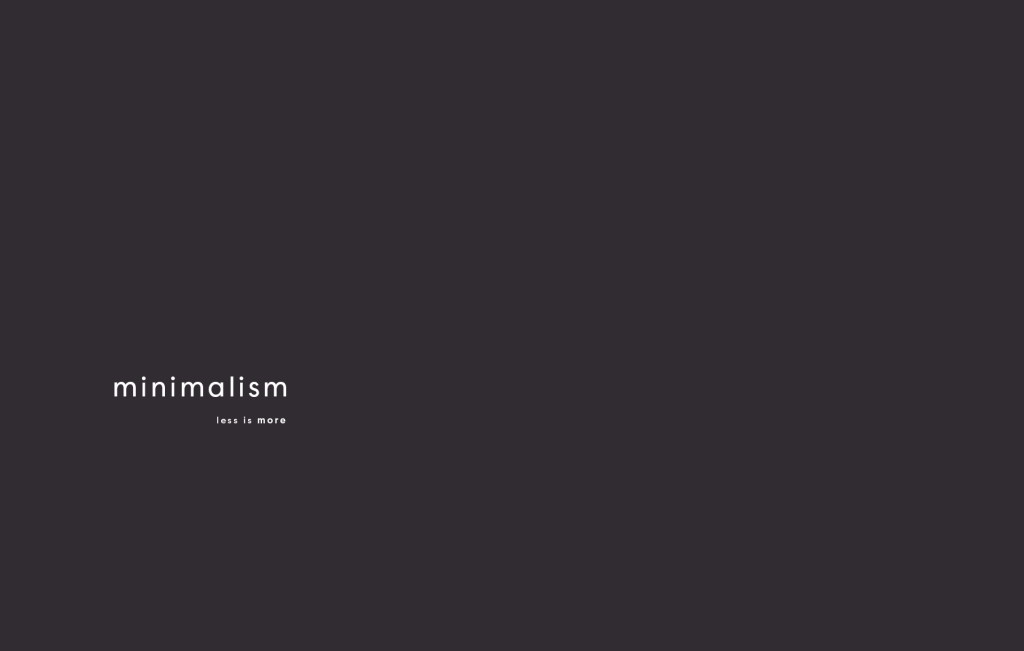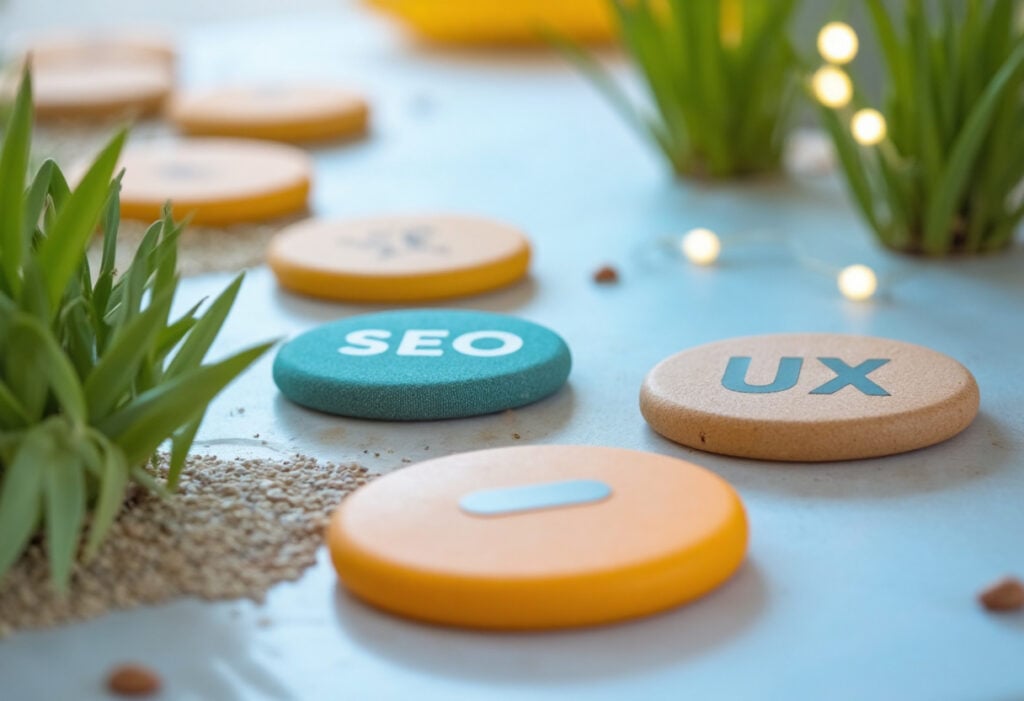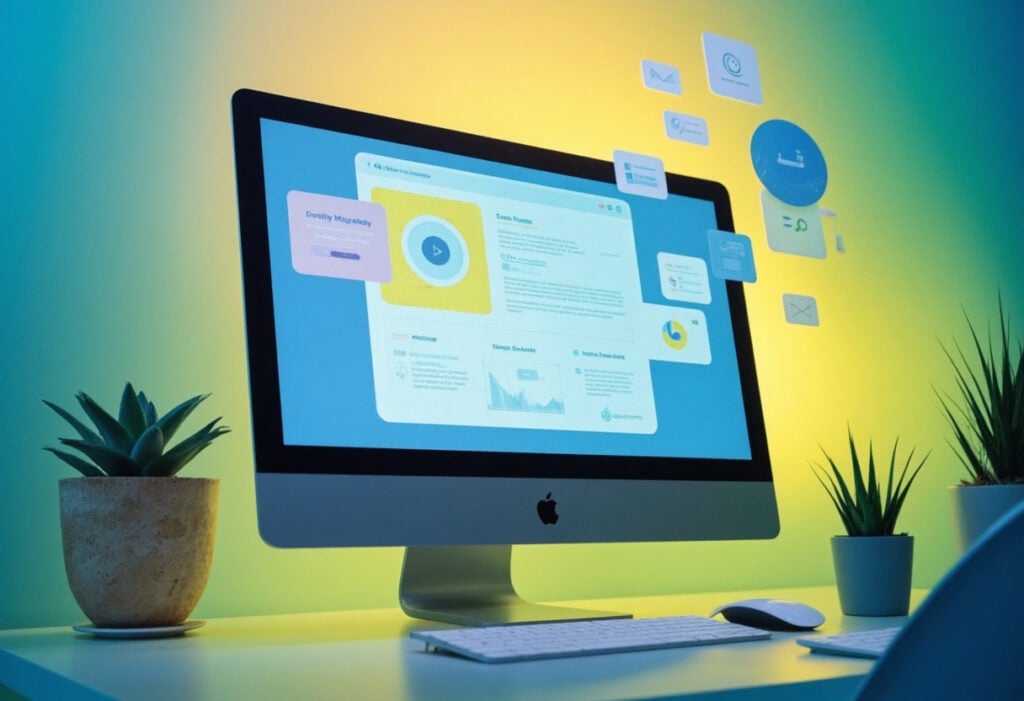Minimalist design is everywhere. As a trend, it has been around for a long time with varying levels of popularity. While there are plenty of examples of early minimalism, its current form dates from the post-war era especially, such as Architect Ludwig Mies van der Rohe’s infamous “Less is more” quote. It is characterised by a complete focus on what is valuable and essential to the user, minimising or stripping away any unnecessary distractions.
As designers, when we consider creating a website, our primary focus is how we can get the user to the content they want in as few steps and with as few distractions as possible.
This article explores minimalist web design examples and what we can learn from them, minimal web design principles and pros and cons of this approach.
5 Minimalist Web Design Examples
Several large companies have embraced minimal web design, focusing on functionality and simple aesthetics. Here’s a round-up of some examples of minimal web design:
1. Apple
Websites such as Apple (yes, a very overused example but still one of the best) use exactly what is needed and no more. This works very well for their main target audience who will be tech savvy and do not need much guidance around the website. There are two simple calls to action (“Learn More” and “Pre-Order/Buy”), enticing images, a catchy title, the menu and nothing else to distract the user from the product.
2. Google
Google’s homepage is well-known for its complete simplicity. The search engine features a simple white background, with the bare minimum in terms of links on the page, keeping the user’s focus on the search bar.
3. Dropbox
Dropbox’s homepage includes a snappy headline, with a one sentence sub-heading to precisely pinpoint Dropbox’s core service. Dropbox highlights two calls to action above-the-fold on the homepage (‘Sign up for free’ and ‘Find your plan’) and makes use of a restrained colour palette of black, white and blue which helps guide the user to follow the call-to-action.
4. Kinfolk
Kinfolk employs minimalist design principles, including making use of whitespace, striking imagery and minimal text.
5. Nike
Nike often makes use of minimalist design, particularly on product pages, by employing bold visuals and concise copy to convey their message and keep the attention on the product.
These examples show how any website can reduce clutter and prioritise essential content to improve user experience and cement their brand identity.
Tips for Building a Minimalist Website
- Use visual hierarchy
- Remove unnecessary elements
- Use whitespace
- Limit options
- Accent colours
Use visual hierarchy
Visual hierarchy is a method of using size, colour and contrast to arrange on-page elements in order of importance. Placing the most important elements at the top of the page is important when employing a visual hierarchy.
Remove unnecessary elements
Unnecessary elements can distract from your core message or CTA. It’s important to include some content such as text and images on-site, however try not to go overboard. Too much text, too many images or calls-to-action can distract the user, and make it difficult for them to find what they need. Consider the navigation of your site too, if there are pages that most users won’t need to access, consider where these are placed in the navigation. Removing any unnecessary elements makes it easier for your website visitors to navigate your site and act on your call-to-action.
Use whitespace
Use whitespace to your advantage to help direct the user’s attention to specific elements or CTAs, such as signing up for your newsletter or downloading a report.
Limit options
Limiting options through including only a few CTAs to make it easier for the user to take the action you’d like them to take. According to Hick’s Law the more options you have, the longer it’ll take for the user to decide. Speed up a user’s response time by including only the most essential options. For example, on a newsletter sign-up form, offer only two options: subscribe or exit the form.
Accent colours
Employ a minimalist colour scheme, with select accent colours to highlight important elements on your website, such as CTA buttons.
Pros of minimal web design
- Places emphasis on content
- Works well for responsiveness
- Keeps loading times down
- Does not date quickly
- More attention grabbing
- Versatile
1. Places emphasis on content
Minimalism allows us, as designers, to place emphasis on the content which promotes good UX so that the user can easily access what they are looking for.
“Good design is obvious, great design is transparent” – Joe Sparano, Design Lecturer
2. Works well for responsiveness
If you are creating a website or updating an existing one, it is important to understand the advantages of a design which is not only optimised for both mobile and desktop viewing but should also address the mobile designs first – or at the very least run the two designs side by side. A minimal design will usually adapt more smoothly and consistently to different screen sizes than a website design that has more complex elements.
“More websites are now loaded on smartphones and tablets than on desktop computers, a milestone that underlines how computing is rapidly shifting to mobile devices and which threatens companies reliant on traditional PCs. Statcounter, a research company that tracks internet use across 2.5m websites, said 51.3pc of pages were loaded on mobile devices in October, the first time they have surpassed desktop and laptop computers.“ – James Titcomb, Daily Telegraph
3. Keeps loading times down
When there are fewer elements on a page it will load quicker. This means far better UX and lower bounce rates, so you can keep visitors exploring your website and engaging with your brand. This is even more pertinent with mobile usage increasing due to generally slower internet speeds on mobile.
4. Does not date quickly
Trends change very quickly so if you base a design on the trends of the time it may well age quicker than a more minimalist approach. Keeping the focus on the content means it can be updated very easily to maintain the attention for the user and improve those all important return visit rates.
5. More attention grabbing
Picture a supermarket shelf full of products. Mostly these are a sea of competing colours, fonts and logos. If one product has minimal content and makes good use of space then its packaging will create a void in the sea of packaging, therefore drawing the eye to itself.
6. Versatile
Minimalism works well with elements from other styles and trends. Small elements can be added to an overall minimalist design to give it some personality and individuality to compliment your brand identity.
Cons of minimal web design
- Simple is not necessarily easier
- Difficult to let go
- Loss of individuality of design
There are several potential pitfalls which will need work and creativity to overcome in order to achieve a successful minimalist design.
1. Simple is not necessarily easier
Often minimalism is perceived as requiring less work because it is not as obvious or complex. A common misconception is that the simpler something is, the easier it is to achieve the end result; accordingly, there is a danger of the completed design being underwhelming. Some argue that it is universally accessible and achievable by even those with little skill or experience but a minimal design executed by an amateur is very likely to look cheap and lifeless. In fact, the converse is usually more accepted: great minimal design requires significant experience to produce correctly.
2. Difficult to let go
You may want to include elements or features because you like them, but it may not be appropriate to use them. As designers, we all have styles and trends which we like and clients have ideas and goals which they want. One way to make these decisions is to utilise your analytics data to see whether call to actions are actually clicked (either through setting up conversions or using the user flow tool). If a CTA is not achieving the goals it is designed for then there is no point using it.
3. Easy to lose the individuality of a design
By stripping away the more decorative elements there is a risk of removing what makes a website or brand easily recognisable.
Minimalist Web Design: Is It For You?
Minimalism in web design is not for everyone. Some businesses just wouldn’t suit a minimalist design. However, a minimalist thought process at least in the early stages of a project will definitely prove valuable for just about everyone even if the end design is on the opposite end of the scale. The core principles of focussing on the core aspects of the product, service, piece or whatever might be being designed can be utilised to help increase conversion rates, user flows and brand messaging.
Yellowball is a web design agency based in London. Contact us today and find out what we can do for your online presence.
Read more: One-Page Website Pros and Cons.









